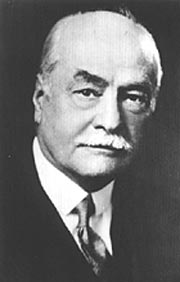Nicholas Murray Butler
Nicholas Murray Butler CC 1882 MA 1883 PhD 1884 was the ruler of Columbia for over four decades (1902-1945). Despite being associated with several controversies, he was probably Columbia's greatest leader.
He also won a Nobel Peace Prize and was a candidate for Vice President of the United States. Butler Library and the Butler Medal are named after him.
Contents
Butler the Student, Butler the Professor
While a student at Columbia, Mr. Butler was a member of Psi Upsilon and the Peithologian Society. He studied philosophy during his time at the university, and after a brief jaunt through Europe, joined the faculty as a philosophy professor in 1885. His academic brilliance led Theodore Roosevelt to dub him "Nicholas Miraculous."
In 1887, he helped found the New York Institute for the Training of Teachers, which later evolved into Teachers College.
Butler the President
Butler was highly influential in creating the Columbia University we know today.
He embraced McKim, Mead, and White's Master Plan for the Morningside Heights campus, and oversaw the construction of many buildings, including Wallach, Furnald, Mudd, Pupin, and Uris Hall. Butler was responsible for the acquisition of South Field, stating firmly that "the area of the site ... will be entirely insufficient for the work of the University in the very near future".
Butler heavily de-emphasized undergraduate education in favor of graduate education, establishing centers of graduate learning, such as the Medical Center. At one point, it was even considered that Columbia College be done away with altogether. However, the College, along with SEAS and GS, have recovered finely, and thanks to his early influence Columbia's graduate programs rank among the best in the world.
He also single-handedly blocked the construction of a Riverside Park stadium by banning football (due to its "rowdiness") and, again, placing a low priority on undergraduate student life.
Controversies
- Butler was a staunch supporter of Benito Mussolini (leading to the establishment of Casa Italiana), and fascism in general. Soon after the establishment of the Nazi regime in Germany in 1933 he invited the Nazi ambassador to the United States, Hans Luther, to speak at Columbia. In doing so, he ignored vigorous student protests, dismissing them as "illiberal", and stated that Luther was an "emissary from a friendly people". (he later rescinded his fascist favor and vehemently supported the US war effort)
- Butler seems to have been invested in an anti-Semitic project. In general, he considered them aggressive and vulgar. During his regime he made sure that Columbia had a very strict Jewish quota. Butler established Seth Low Junior College in a lame attempt to pacify his critics. In addition, only two Jews served on the Board of Trustees during Butler's reign: Benjamin Cardozo from 1928 to 1932, and Arthur Hays Sulzberger, starting in 1944. He respected some Jews, the sparkling example being the awarding of tenureship to Lionel Trilling in the English Department, but these were more like exceptions to the rule.
See also
- Nicholas Miraculous, a biography of Butler by Columbia English professor Michael Rosenthal
| Preceded by Seth Low |
President of Columbia University 1902-1945 |
Succeeded by Frank Fackenthal (acting) |
